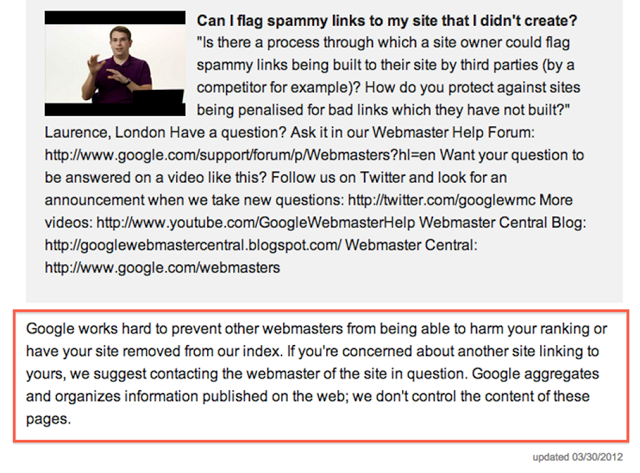
Guest Post – Today’s host is Brian Nixon, who looks at the darker side of SEO.See How To Become a guest author on Spice Up Your Blog.
Kill your competition with negative SEO, Destroy Your Competitor, adverts selling negative SEO seems to have sprung up all over the web. So far the webmasters largely believed that while spammy backlinks wouldn’t pass on any benefit to a website, they couldn’t hurt the site either. Google Penguin, however, has changed things and it’s time to look out or talk with your SEO company about this.
But recently on the Webmaster forum itself, Google acknowledges that a third party could affect your site’s ranking.

What Is Negative SEO ?
Theoretically, the fear of negative SEO is a very real one. Penguin clearly targets webpspam and Google has expressly stated that it would penalize sites with spammy backlinks. So, there’s nothing stopping those offering cheap bulk backlink building services from re-branding themselves as ‘Negative SEO experts”. The expenditure involved is not huge; less that $100 in most cases!
The key questions concerning webmasters are—“Is negative SEO practically possible? “Are we looking at some sort of SEO terrorism?”
The answers are, Yes and No.
What Are Practical Negative SEO Tactics?
Negative SEO could include, hacking into someone’s website, changing the codes, barring search engines from indexing the pages, injecting spammed links, malware, etc, into your site. You can safeguard your site against these kinds of attacks by plugging the security loopholes.
The actual fear inducing tactics, however, are low-cost ones that don’t require a lot of time and money. These include:
- Outsourcing spammy backlinks to get your site penalized.
- Reporting your site for spam and spammy links to Google.
- Writing Multiple Fake reviews on your business listing in Google Places to make it look like you are posting them.
- Stealing your site’s content before it’s indexed and posting it somewhere else, to make your content look duplicate.
Should Webmasters And Bloggers Be Scared?
Not scared, but webmasters need to be aware. Manipulative negative SEO strategies like building hundreds of spammy links to your site will work only if you do not have a solid, diversified inbound links portfolio created through classic white hat techniques.
This means if you have been doing your social media and content marketing right, have earned your links and social signals, you will be in the low-risk group for negative SEO attacks.
These campaigns are focused on identifying your site’s weaknesses and exploiting them. The stronger your on-site and off-site SEO is, the lower will be the chances of your site getting attacked or affected.
Google gets thousands of Spam reports every month. Your site is at a risk of facing penalty if you have been indulging in spam or offer a poor user experience. A spam report may get Google to take a closer look at your site. However, if your site’s SEO looks natural (you haven’t stuffed in keywords, host good quality original content, update the blog section regularly) and provide an overall good user experience, the spam report is not likely to affect your site much.
As far as fake reviews are concerned, your only defense is to keep your eyes open and take a proactive approach towards negative SEO. If you spot a couple of suspicious looking reviews, use the “report a problem” option.

Report Suspicious Reviews
You can prevent people from stealing your site’s content by bookmarking it to social sharing sites as soon as you post. Not only is it a good practice, in terms of building your site’s social reputation, bookmarks on reputed sharing sites get the content indexed faster.
Finally, make sure you set up a Google Webmaster account and check-in regularly. Mails about un-natural links or other concerns about your websites will be sent to this account. So, you will get to know about any negative SEO problems before they get out of hand.
That negative SEO exists today is a fact, whether it can really affect your site largely depends on the SEO techniques YOU follow. As long as you:
- Create a diversified link profile.
- Earn links through well-written editorial contributions to authority sites.
- Focus on engaging the user through good on site SEO and remarkable content.
- Use a good mix of keyword as well as brand name anchor texts.
- Engage your target market through positive and effective social media marketing; you do not have much to fear!
- Even if you haven’t been practicing these SEO techniques, you can start now. Not only will they help you improve your SERPs, but will also offer protection against negative SEO.

By Guest Author – Brian Nixon, is a professional search engine optimizer who writes for SEO Company Pitstop Media Inc, a Canadian company that provides top rated SEO services to businesses across North America.












